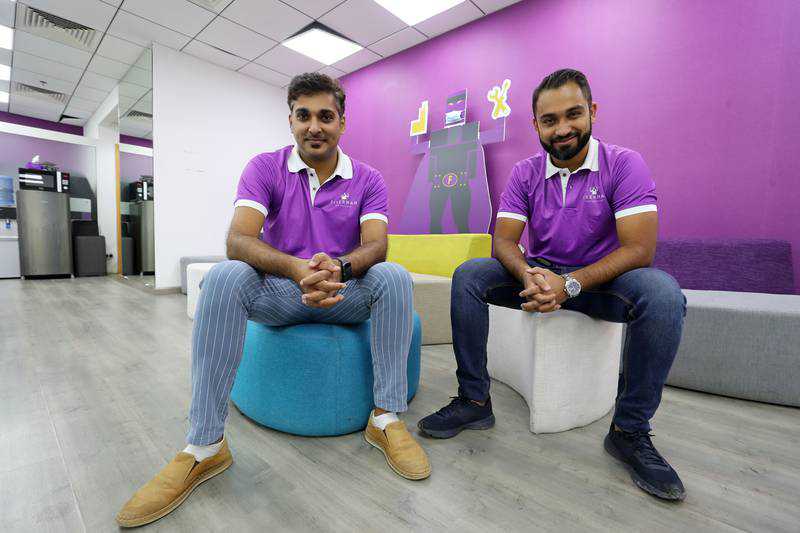Generation Start-up: How Fixerman is hoping to cash in on rising smartphone use

Amid rising concerns about climate change, a Dubai-based start-up aims to expand its gadget repair business across the region but with a focus on sustainability.
Fixerman has converted a large-sized van into a mobile phone repair service centre, which is fully powered by solar energy. It repairs mobile phones, laptops and tablets at its customer’s doorstep.
“The whole service part is completely done on solar power inside the van. The equipment that is used in repairing gadgets run on solar power with solar panels fixed on top of the vehicle,” says Jassim Bangara, founder and chief executive of Fixerman.
“We're actually making a statement … let's try to achieve carbon neutrality in a way we can and it is extremely important in today’s world.”
The UAE aims to become carbon neutral by 2050, while other countries in the region including Saudi Arabia and Bahrain, aim to reach the target by 2060.
A chartered accountant by profession, Mr Bangara started the company in 2016 after noticing a gap in the phone repair services “which, didn't quite completely cater to the requirement of the tech-savvy market that we have in the UAE”, he says.
There are nine million people in UAE but there are 17.1 million mobile subscriptions, so “we use our phones a lot ... there are people with two and sometimes even three phones”.
However, to cater to them, the country had only stores in the malls – inconvenient for those with busy schedules – or those "in the disorganised sector, where you don't really necessarily have that quality control when you give your device to them”, Mr Bangara says.
“We have a different kind of services. One is I will come to you, and we fix the device in front of the customer. However, some devices require a deeper level of repair, and for those customers, we have pickup and drop-off services with our fixer hawks. They go around the city, picking up devices from customers, dropping into our studio, we fix it, and then we drop it back.
“There’s a third kind of service where customers actually visit our studio," Mr Bangara says. "It’s an open kitchen concept with jazz music playing on in the background while we repair the device.”
Customers can contact Fixerman by a toll-free number or through social media channels such as WhatsApp, Instagram and Facebook.
Mr Bangara is bullish about the growth of the company as mobile phone usage booms after Covid-19 as consumers switch to online payments, shopping and entertainment.
More than 60 per cent of residents recently polled by payments company Visa in the UAE reported an increase in the usage of mobile payments.
“The market is huge, and our dependency on the phones is only increasing. On average, we look at the phone 58 times a day and its usage is increasing as the number of apps goes up,” he says.
Fixerman recently opened its mobile service centre in India and aims to expand across the Middle East as the internet penetration and mobile phone usage continues to grow spurred by the pandemic.
“We have very aggressive plans for the future,” Mr Bangara says. “We want to spread our reach to the Middle East and we are going to start with the GCC countries initially and then we will look at other countries after that. We also have expansion plans in India where we've recently started the first solar powered smart repair centre in Kerala.”
The company, however, has competition from authorised service providers to centres located in Karama, Al Qusais or Satwa, Mr Bangara says. But Fixerman is highly rated by the customers “in the way that we are doing things”.
Revenue jumped 300 per cent in 2019, while the company recorded an 85 per cent growth last year as demand rises. Fixerman expects double-digit growth in revenue in 2021, Mr Bangara says.
“We are very optimistic about what we can do and we are investing in the technologies to enable us to do more devices.”
The company served more than 20,000 customers in the last four years and it employs 22 people. It is planning to raise more funds for expansion. Mr Bangara did not elaborate on those plans. "We've been self-funded so far ... very shortly we will be going out into the market to raise funding.
Previous Story
- Facebook says mercenary spy firms affected 48,000 people
- Facebook reverses Kyle Rittenhouse search policy
- Asia's virtual influencers offer metaverse glimps
- Whistle-blower claims Facebook amplified extremism
- Facebook should not have bowed to public outrage...
- Facebook to end use of facial recognition software
- Whistleblower blasts Facebook's Meta rebrand
- SCENE - Explore local, exciting craft and gift...